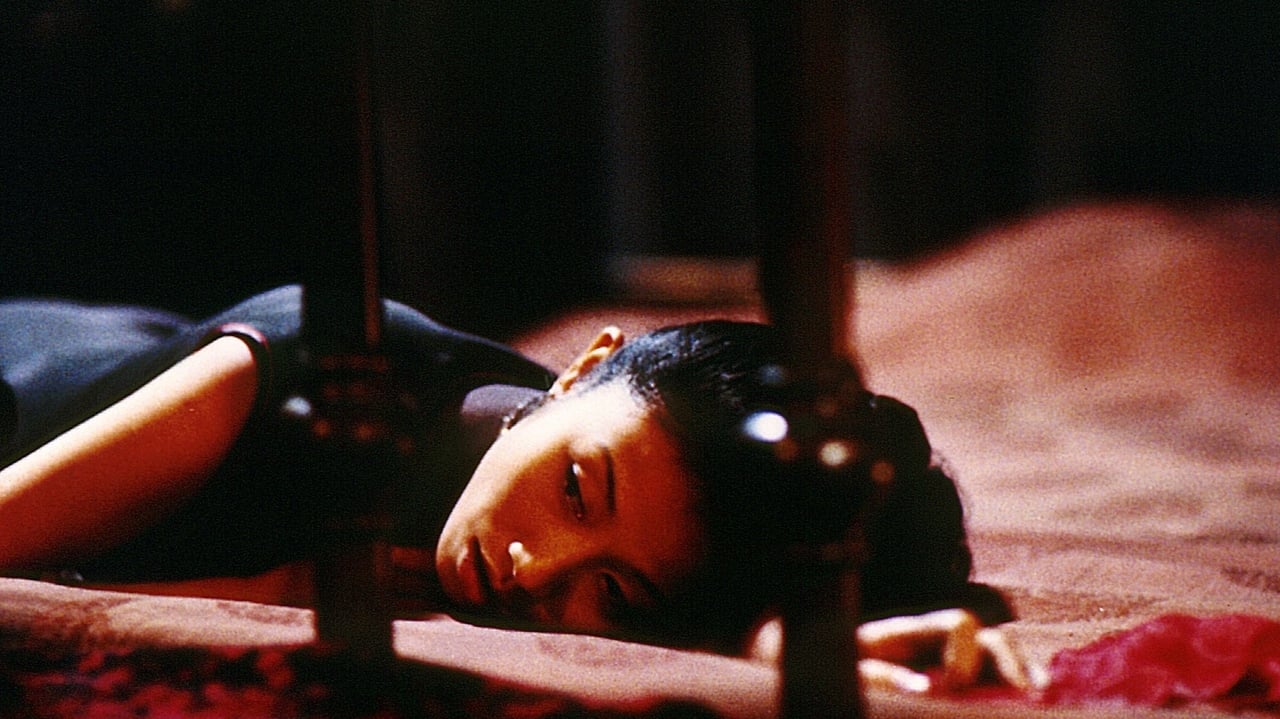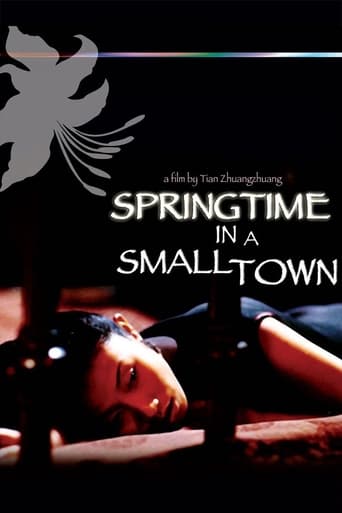

Very very predictable, including the post credit scene !!!
... View MoreInstead, you get a movie that's enjoyable enough, but leaves you feeling like it could have been much, much more.
... View MoreI cannot think of one single thing that I would change about this film. The acting is incomparable, the directing deft, and the writing poignantly brilliant.
... View MoreBy the time the dramatic fireworks start popping off, each one feels earned.
... View MoreSpringtime in a small town is not a film I plan to see again. I found the cinematography and the set to be beautiful and was really expecting to see another In the Mood for Love. Actually, with its quiet restraint, Springtime belongs to another era and should have been made half a century ago. In fact, it was, and although I haven't seen the original, I hear it is much better than the remake. That must be true because this is a story for 1948 audiences.The problem with Springtime is that despite the beauty, nothing happens. The audience is not drawn into the quiet frustration of the central characters. Thats partly because the doctor upsets the balance of the whole structure. Eventually the whole exercise gets tedious and is only momentarily enlivened by the childish drinking games at one family dinner.I don't think its fair to compare this to In the Mood for Love or Remains of the Day. There is no such depth to the story.
... View MoreThe Chinese film Springtime in a Small Town is a stately, unwaveringly discreet movie, but one with more quiet resonance than many of its Western equivalents. It reminds us superficially of the films of Merchant-Ivory - it possesses the sense of tactful distance, the quality of not wanting to deal with any unseemly emotions, that characterizes such staid, painterly efforts as Howards End, A Room With a View and that classic of repressed-librarian-cinema, The Remains of the Day - but director Zhuangzhuang Tian has a greater talent for letting emotion slip in the backdoor than James Ivory, who is often lauded for his subtlety, but is not criticized enough for being a prudish old grandma. Zhuangzhuang's film involves a quartet of characters engaged in a slow, elegant emotional dance. The story takes place in the aftermath of WWII, when China is just starting to pick up the pieces after the devastation wrought on it by the Japanese. Sickly Dai Liyan (Jun Wu) lives with his dutiful-but-frustrated wife Yuwen (Jingfan Hu) and bubbly young sister Xiu (Si Si Lu) in a large, dilapidated house; Liyan's old friend Zhang Zhichen (Bai Qing Xin), a doctor and ex-resistance-fighter from Shanghai, drops in for a visit, much to the delight of everyone in the dreary household. Zhichen, it turns out, was also childhood friends with Yuwen and Xiu; we quickly realize that Zhichen and Yuwen still have feelings for each other, and learn that they had designs on marriage before the war whisked Zhichen away. The personalities of the characters are all carefully delineated, and fit with each other like pieces of a puzzle; Zhuangzhuang puts the picture together slowly, eschewing big dramatic revelations for moments where the relationships take subtle shifts. Such an exercise in formality, peopled by characters who are not exactly big on coming out with anything (except little Xiu, who has still not learned what it means to be a lady), will inevitably wear on the patience at times, but Zhuangzhuang has a way of injecting enough subdued poetry into his images that we don't mind the time it takes for the pieces to snap into place. It's not the kind of movie that reaches for big emotional effects, but neither is it the type that seems to shy away from emotion altogether. Movies like the Merchant-Ivory works are fastidious, grammatically impeccable and fairly heartless, while Springtime in a Small Town, for all its restraint, manages to resonate in the end. The difference between James Ivory and Zhuangzhuang Tian is obvious - Ivory keeps his distance for fear of emotion, while Zhuangzhuang keeps his out of simple politeness.
... View MoreSpoilersAn alternative title of this film could have been the one for a recent local play in town: 'Tiny ripples in still waters' (as literally translated. 'Still waters' obviously have nothing to do with the fictitious rock band featured in 'Almost Famous'. It just means a dead pool).This film reminds me immediately of the Italian gem Facing Windows I saw recently in Toronto, for which my comments started out thus: 'The ripple-in-a-mundane-life type of story is difficult to handle'. Both films deal with a stagnant marriage, and the ripple created by the intrusion of a man. The circumstances are however different, but I am not going to start comparing and contrasting the two. For Springtime, the main cause of the marital problem is the husband's (Liyan) lingering ailment. His home-coming childhood friend (Zeichen) turns out to be also the wife's (Yuwen) teen sweetheart. The only two other characters are Liyan's little sister, just turning 16, and a faithful old manservant.The pace is slow but the film is absorbingly mesmerising. Behind the deceptively simple dialogue is an undercurrent of ebbs and flows of emotions, particularly in the case of Hu Jingfan playing Yuwen. (Look beyond the surface of the words she speaks into the subtly varying tone, the nuances, and the ever so slight shift in the timbre of her voice). Masterly use of a slowly panning camera creates the melancholy mood sustaining the intriguing lure of the film. Particularly worth mentioning is the brilliant climax of the 'drinking' scene. I won't spoil it with inapt descriptions. If Hu Jingfu's performance has been subtle hitherto, it's sparkling in that scene.Film critics in town who have seen the original 1948 version claim that it is even better. Hope to get a chance to see it. In any event, this re-make is well worth recommending to those who have the capacity to appreciate.* * * *Update - March 2005.Have now seen the original, which certainly lives up to its reputation, but can't agree with the verdict that the remake is inferior.
... View More[See IMDb main page for this film for cast names-none are known outside China]"Springtime in a Small Town" is director Zhuangzhuang Tian's re-make of the 1948 film of the same name, an intense and rare example of Chinese film-making from that turbulent time which few have seen.The time is after the Japanese surrendered and before Mao drove Chiang to Formosa. In what was once a munificent villa, saved from utter destruction after a Japanese air raid by a fortuitous cloudburst, the Young Master, Liyan, lives with his wife, Yuwen and his sister, Dai Xiu, a perky teenager on the cusp of womanhood. They are served by a faithful family retainer, Huang.Liyan appears ill with a persistent hacking cough and he alternately consumes and refuses herbal medicines. Into this domestic scene arrives, after a ten-year absence, young doctor Zchichen, a boyhood friend of Liyan and, as it turns out, a fellow who knew Yuwen before her arranged marriage. Quick examination by the novice M.D. reveals what most viewers would have already suspected: Liyan is a pitiful hypochondriac whose self-absorption drove his pretty wife into a separate bedroom long ago.What follows is the growing mutual attraction of Zhichen who harbors long held deep feelings for Yuwen and the woman's awakening awareness that her marriage is a sham: she knows she made a mistake by not leaving with Zhichen a decade earlier.This is a story told largely through dialogue between the three protagonists. A few scenes have them gamboling outside the compound but only one, with a number of teenagers, is actually in the nearly burnt out village. An amusing rowboat outing has the group singing in Chinese to the tune of "The Blue Danube."This being a Chinese romance of sorts, moral values and not simply fear of the censor restrain Yuwen and Zhichen's gnawing passion for each other. They suffer all the pain of deep guilt with none of the offsetting pleasures of carnal consummation.The story, by itself, is neither unique nor totally absorbing. I felt like yelling out to Liyan, "Hey fellow, stop this pretense of being very sick and get your house in order before you no longer have one." But I behaved.There is a political coda to "Springtime in a Small Town" that very many Chinese won't miss and neither will foreign viewers acquainted with modern history. For a start, at the beginning of the film a title-board expresses Tian's regard for the Chinese film-makers of 1948 who produced the original version. That establishes a link with a past that has a a gaping interruption, an important albeit quiet statement by this fine director.In all cultures with sharply varied seasons, spring is always seen as a time of renewal for both man and nature. That point is elegantly portrayed in the current, beautiful Korean film, "Spring, Summer, Autumn, Winter...and Spring." Movies, literature and even classical music celebrate spring as a time of hope and regeneration (and it's not for nothing that the hit song in the musical and movie, "The Producers," is "Springtime for Hitler :) ).As "Springtime in a Small Town" ends Liyan and Yuwen tend a garden emerging from winter. However hopeful their outlook, any knowledgeable viewer knows that they will shortly face public accusation, humiliation, self-abnegation, loss of property and - not unlikely - death by a People's firing squad as bourgeois landowners. Their spring will be followed by a deadly political winter and Tian subtly reminds the audience that the next chapter in China's postwar history is one of repression and pain.A common enough love triangle before a deep and depressing chapter of a great people's imminent descent into chaos and even mass madness. This film is a healthy indication that China's film industry is slowly recovering.8/10
... View More